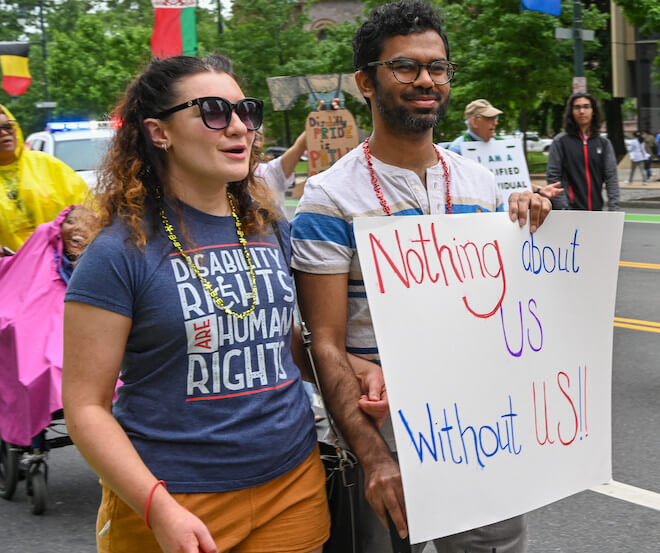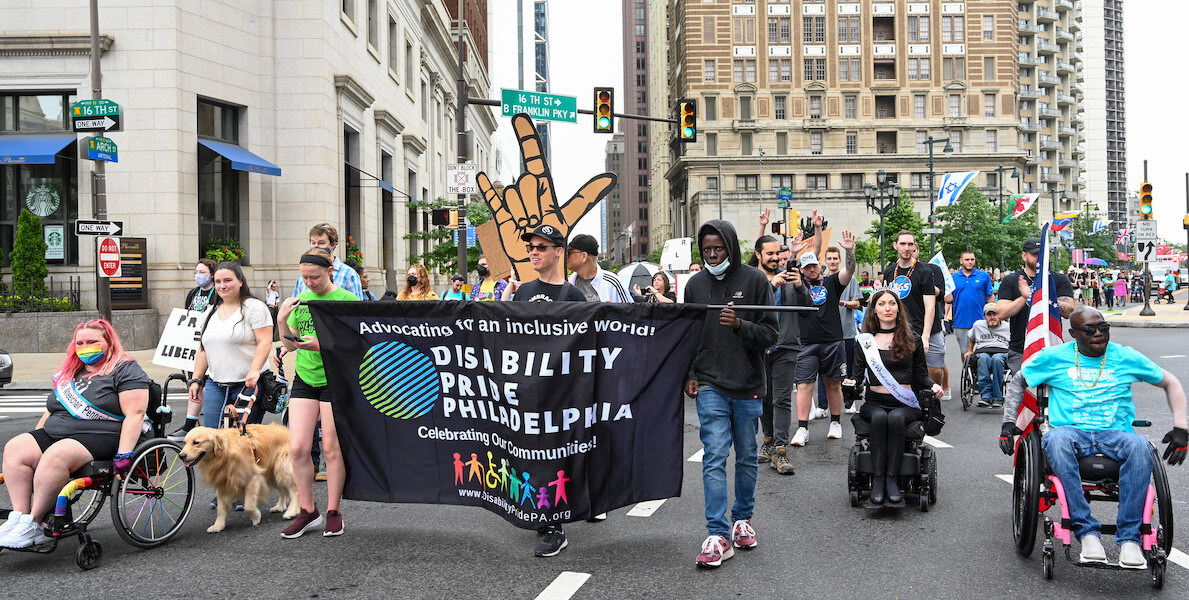It’s election season, and most people are buzzing about the candidates for mayor, City Council, and judgeships. But political offices aren’t the only things on the ballot. Also on the ballot is a Charter amendment to create a permanent Office for People with Disabilities.
What is the Charter, and how is it amended?
The Philadelphia Home Rule Charter structures local government, giving every City department, board, commission, and office its authority — including the Mayor and City Council. It’s Philadelphia’s Constitution, not a mere document of rights but a structure.
Because of the Charter’s significance, changes (amendments) fall outside the usual legislative process, requiring Council to first pass amendments by a two-thirds majority, and then get voters’ approval. Charter amendments appear as “yes” or “no” questions on the ballot.
Usually, there’s an average of five ballot questions for voters to decide. But this time, there’s only one.
This is what voters will see this fall:
“Should the Philadelphia Home Rule Charter be amended to create an Office for People with Disabilities to coordinate the City’s compliance with requirements to provide access for people with disabilities to City services and programs and to otherwise provide for incorporation of the Office into the City government?”
What does that mean? Let’s break it down.
The history of this Charter amendment
In 2017, Mayor Jim Kenney signed an executive order creating the Mayor’s Office on People with Disabilities as a subsidiary of the Office of Diversity, Equity, and Inclusion. Because the Office was created via executive order, any future mayor could disband it. I doubt that would happen. But we legislate not for the present but for posterity.
To prevent the Office from ever getting rescinded, At-large City Councilmember Kendra Brooks introduced a Charter amendment to make the Office for People with Disabilities permanent.
No one testified against the measure, signaling that the amendment is uncontentious. But recent history tells us that the passage of uncontroversial ballot questions is not a given.
Under the amendment, the Office for People with Disabilities would replace the Handicapped and Disabled Advocate. Amy Nieves, the executive director of the Mayor’s Office for People with Disabilities, praised this, saying the term “handicapped” is harmful. Building on its current duties, the Office would coordinate Philadelphia’s compliance with federal, state and local accessibility requirements.
The Office would also serve as an accessibility watchdog, receiving complaints and inquiries about access to City services, programs and public accommodations. Where appropriate, the Office could refer those complaints to the Philadelphia Commission on Human Rights or other law enforcement agencies. Additionally, the Office could create programs to educate the public, addressing ableism and disability-positive practices.
The Committee hearing
When it went through the Council Committee on Law and Government, City accessibility leaders testified to support the amendment. Nieves testified, underscoring the Office’s productivity despite its short existence — having been created just six years ago. In 2022, for example, they launched a Disability Characteristics Map. The map shows disability statuses, types, and demographics in every Philadelphia neighborhood.
It also reveals that Philadelphia, in addition to being the poorest big city, also has the highest disability rate of large U.S. cities. Some 16 percent of Philadelphians are disabled. According to the Office’s estimates, that’s in the ballpark of 246,000 people, roughly the population of two Council districts.
Nieves said the “map has been transformative to our city. Since its launch, thousands of users have utilized the map to inform their work plans, gain grant funding, shift their dialogues around disability and inclusion. It has also had a national and global influence in the disability demographic space and how we look at demographics.” The map was so groundbreaking that the Office was invited to speak before the U.S. Access Board, a federal agency that promotes equality for people with disabilities.

This is impressive, given Nieves’ testimony that “the Office for People with Disabilities is a small agency. There’s only two of us currently, and yet we have a community of a quarter of a million Philadelphians to serve.” Nico Meyering, of the Mayor’s Commission on People with Disabilities, also spoke at the committee hearing and described the Office’s budget as “bare-boned,” noting the greater possibilities for the Office if it became a better-funded, permanent fixture in government.
Making the issue more salient for the Committee members, Alexander Casper, a public servant, shared his personal experiences with accessibility in Philadelphia: “I have latex allergy, which is an airborne allergen, and I have asthma, and these set limitations and barriers on the types of indoor spaces and sometimes even going outside on days like today. Some of the places I can’t go to would be our libraries, some medical 11 public health centers, because we use latex items commonly throughout many of our government facilities. Sometimes City Hall is decorated in my allergy — as an airborne allergen that impacts about 6 percent of our community members.”
No one testified against the measure, signaling that the amendment is uncontentious. But recent history tells us that the passage of uncontroversial ballot questions is not a given.
Will voters approve it?
Whether this ballot question will pass depends on a smorgasbord of arbitrary factors, including voters’ inclination to choose yes by default (yes bias). Because of yes bias, it’s usually assumed that amendments will pass with little fuss. But earlier this year, a wholly uncontroversial ballot question failed by a thin margin.
The amendment that failed would have made it easier for the Citizens Police Oversight Commission to hire staff and provide police accountability. But Philadelphians were frightened by the words “exempt” and “police” being in the same sentence and voted against the question.
This teaches us that we cannot take for granted that voters will rubber-stamp whatever amendments Council asks them to vote on. While voters are still unlikely to reject ballot questions, there’s no foolproof way to ensure people will understand what they’re voting on. So, there must be a concerted, intentional effort to educate voters on their choices.
It’s pretty benign, so it would be unusual for this to fail. But weirder things have happened in Philadelphia. So, no matter where you fall on this question, make sure you vote.
The deadline to register to vote is October 23. If you plan to vote in person, Election Day is November 7! If you plan to vote by mail or absentee, the deadline to request one is October 31.
Jemille Q. Duncan is a public policy professional, columnist, and Gates Scholar at Swarthmore College.
![]() MORE ON THE 2023 ELECTION
MORE ON THE 2023 ELECTION



